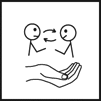A Good Question
This is a question I often hear posed by clients, how do I know if I am ready for this process? This is a good question and a great starting point for counselling. The answer is really a matter of personal readiness. It may be that you have come to counselling because you are facing some major life trauma like bereavement, loss of a job or the ending of a relationship, or it could be that you feel there are parts of your personality that you would like to explore more and possibly even make changes to. It may even be that someone else has suggested that you might find counselling useful like your partner, friend or GP.
Where Do I start?
It may be difficult to begin when you meet a counsellor for the first time but in my experience the best way is to let the counsellor know what is going on for you in the present. Whatever is at the forefront of your mind. Even sharing how you are feeling about starting counselling which may be fear, excitement or nervousness. Just sitting in the chair and talking about this may help you to feel more at ease and your counsellor will always do his/her best to help you with this.
As you progress through the first session you may feel that you have too much to share or that you can't get it all out. Remember that counselling is a process, a road that your counsellor will travel with you. There is no limit on how long this will take so allow yourself to go with the process.
Not Sure If This Is For You?
If you think you would like to begin counselling but are not sure if this is for you then you can arrange an initial session. Most counsellors offer these and it is your chance to ask questions and make sure you feel comfortable with that counsellor. It will also allow you to explore with your counsellor if this is the right time for you. (See also my blog on what to expect in the first session.)
It is no secret that counselling can be a hard journey and challenging at times. It is important that you are sure that the person taking that journey with you is someone who makes you feel comfortable, understands you and is willing to come with you down the road.
If you are thinking about starting counselling please feel free to contact me and I will try to answer any questions that you have.
Fiona
